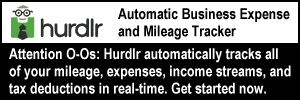Before we address the subject of how to “lose money” as a trucker, we first need to back up and define what we mean by “lose.”
 For the purposes of this page, we are going to use the following descriptions of “lose” from Wordnik:
For the purposes of this page, we are going to use the following descriptions of “lose” from Wordnik:
- v. To be unsuccessful in retaining possession of; mislay: He’s always losing his car keys.
- v. To be deprived of (something one has had): lost her art collection in the fire; lost her job.
- v. To consume aimlessly; waste: lost a week in idle occupations.
- v. To cause or result in the loss of: Failure to reply to the advertisement lost her the job.
- v. To suffer loss.
From these definitions, we see that there are two basic actions:
- what one does (or allows to happen) to oneself and
- what happens to a person through no fault of his/her own.
So, we’re going to address some common ways that truckers lose money by both types of actions.
You may know of other ways that this can happen and we welcome your feedback.
Ways Truckers Can Lose Money Voluntarily
There are plenty of ways that truckers lose money voluntarily or let it “slip through their fingers.”
We’re going to put these into five categories.
Truckers Lose Money with Food and Drink
- Eating out in a truck stop restaurant when you have (or could have had) food with you to eat in your truck — unless the meal is allowed in one’s budget;
- Buying coffee you could have taken with you (if you drive locally) or made in your truck with a 12-volt coffee maker or A/C-powered coffee maker/inverter combination (if you are an OTR trucker);
- Purchasing snack foods in a convenience store when you could have packed them from home; and
- Buying convenience foods — or foods in convenience packaging — when your home support team could have supplied canned or other foods for you from home for less money per serving.
Truckers Lose Money with Things Unused or Under-used
- Buying a trucker gym membership that you never (or seldom) use;
- Choosing a more expensive cell phone plan when a less expensive one will more than meet your needs;
- Buying tools or training you never use or don’t use to full potential;
- Paying for subscriptions that you don’t use (such as for magazines that you don’t read); and
- Letting food that you packed in your truck to eat on the road spoil before it can be eaten.
Truckers Lose Money through Debt and Unnecessary Payments
- Paying interest on revolving credit card debt;
- Spending money to use a toll road when a free route would have gotten you where you were going just as quickly (especially if your trucking company doesn’t reimburse you);
- Paying for things twice (like warranties on products already covered);
- Buying things in truck stop stores that you don’t really need;
- Spending money on overage charges (such as for time or data) on cell phones, mobile broadband services or other electronic services;
- Paying for Internet service when WiFi is available (assuming all firewalls and other protections are in place); and
- Paying more for some items because you didn’t compare prices on products and services.
Truckers Lose Money through Poor Choices
- Allowing your truck to be vandalized or even stolen after parking in a crime-prone area when you could have parked in a safe location instead;
- Not having adequate anti-virus and related software installed and updated on your computer to protect your files;
- Signing up for a paid monthly service membership that can’t help you in your time of distress (such as a so-called legal services plan that fails to help truckers when they most need it);
- Setting yourself up to be targeted by geotagging your location;
- Getting involved in a low clearance trucking accident because you relied on a non-trucking-specific GPS;
- Paying for tickets or towing for preventable actions (like speeding or parking in a “no truck parking” area);
- Spending money on tobacco products (which if used also hurt your health and can lead to further loss later on);
- Making an error in goal setting by buying cheap products that wear out more quickly instead of better quality products that last longer;
- Spending too much money on self-gratification or entertainment instead of making and sticking to a budget;
- Spending money on a home that you’re seldom in and that provides no return on investment instead of putting your possessions in much less expensive self-storage — unless your home support team is in it;
- Buying items from someone hocking them out of the back of his car when you have no idea of the quality of the products or their origin.
Truckers Lose Money through Neglect or Lack of Knowledge
- Letting interest accrue on outstanding tickets (like one former truck driver training school fellow student of ours did);
- Not being good at record keeping (keeping receipts) that lead to tax deductions;
- Paying for charges on your credit card bill that you didn’t make (because you didn’t review your monthly statement);
- Not getting a signed receipt for payment of services that could have been turned into your trucking company for reimbursement;
- Paying for small truck repairs that you could have easily done yourself if you had the right tools and knowledge;
- Not getting a refund for an item at a truck stop that doesn’t work for you within the allotted time frame;
- Not processing trucking paperwork promptly and consequently losing the potential ROI you could have made from prompt investing; and
- Paying more out-of-pocket following a claim because you had insufficient truck insurance, when paying just a little more for insurance could have resulted in no out-of-pocket expenses.
Ways Truckers Can Lose Money Involuntarily
The following list contains some ways that anyone — not just truckers — can lose money.
For educational purposes only, we list these ways that money (or other assets) get taken from people through no fault of their own, so that you can be as prepared as possible to guard against them.
Bank Failure
There have also been many, many bank failures in the USA since 2000.
When Mike learned that a bank we had had our money in failed in 2007, the first question Vicki asked was, “Did we lose everything?”
Thank God that the bank that took over guaranteed the funds that we had deposited with the one that failed.
But with one fell swoop, everything we had worked for years to save could have been gone.
If you think that your deposits are safe in the event of a bank failure, you need to read “read this and see this.
demonocracy.info/infographics/usa/fdic/fdic/ (no longer online)
Deposit Confiscation
Americans may not be as familiar with this as folks in Europe, but some deposits from savers in Cyprus were confiscated.
demonocracy.info/infographics/eu/cyprus_crisis/cyprus_crisis/ (no longer online)
Back on March 19, 2013, Zero Hedge reported that “no deposits are safe”.(1)
Investment Loss
Every type of investment carries some amount of risk. For example, houses and trucks can get flooded.
At one time, we invested in mutual funds and individual stocks.
Mike did all of the research himself and for a time we were making a return on our investments. When the time came that we experienced a 26% loss, Mike determined that enough was enough and we sold all of our shares.
Some types of investment vehicles are less prone to loss than others.
Theft
One driver experienced loss from items stolen from his(?) truck while it was in the shop.
The driver didn’t say how much the stolen items were worth, but another trucker said he had an “ipod taken” from their truck’s bunk.Perhaps these things could have been removed from the truck before it went into the shop; then again, some valuable items are mounted in a truck like CB radios.
To what extent does one try to protect himself against theft?
Heavy Medical Bills
One of Vicki’s relatives was admitted to the hospital where he underwent extensive testing and treatment that could not keep him alive.
His spouse ended up with thousands of dollars of medical bills that insurance did not cover.
A 2012 article from the U.K. says, “The report, released this week, depicts a bleak picture of the future, with a growing number of pensioners slipping into poverty as they use up their savings to fund care and rely on friends and family for help.”
telegraph.co.uk/news/uknews/9652629/Care-bills-will-soak-up-most-of-our-savings/ (no longer online)
![]() Money saving tip: Obviously, there are things you can do to not lose money voluntarily.
Money saving tip: Obviously, there are things you can do to not lose money voluntarily.
And in some cases, you might be able to lessen the loss of involuntary actions taken against you.
For example, when we switched car insurance agents in 2012, our new agent urged us to increase the uninsured/underinsured part of our insurance policy.
He said that if we left our coverage at the old level, we would have to pay more out-of-pocket if we experienced a particular type of loss.
When applied in a commercial truck sense, owner-operators should regularly review their truck insurance regularly.
Ask your agent if the level of your insurance will cover your truck in certain (or likely) situations.
Be aware that you can be “insurance rich and cash poor.”
Be careful about trying to protect yourself against every type of loss.
Your budget can help guide you.
Educate yourself about reasonable precautions and protections you can take against losing money.
If you’re so inclined, investigate extra protections.
Once money is lost, it may likely never be recovered.
Consider the trade-off in doing things for yourself versus having others do them for you.
For example, how much money could you save if you eat meals in your truck versus eating them in restaurants (cost of meal, cost of tax and cost of tip all added together)?
Run the numbers.
If you eat a breakfast restaurant meal priced at $7.99 and you’re in a place in California where the tax is 10% (add $0.80) and you leave a $4 tip, your total cost is $7.99 + $0.80 + $4.00 = $12.79.
How many eggs, how many slices of toast and how many pieces of meat could you have fixed in your truck for that?
Is it worth it to you to eat out, even considering your time?
Consider all of the things that you’re spending money on as well as things that could cost you money that you could have put toward saving opportunities.
Return from Ways Truckers Lose Money: Lessons on Prevention and Planning to our Budgeting page or our Truck Drivers Money Saving Tips home page.
References:
1. www.zerohedge.com/contributed/2013-05-15/no-bank-deposits-will-be-spared-confiscation (no longer online)







